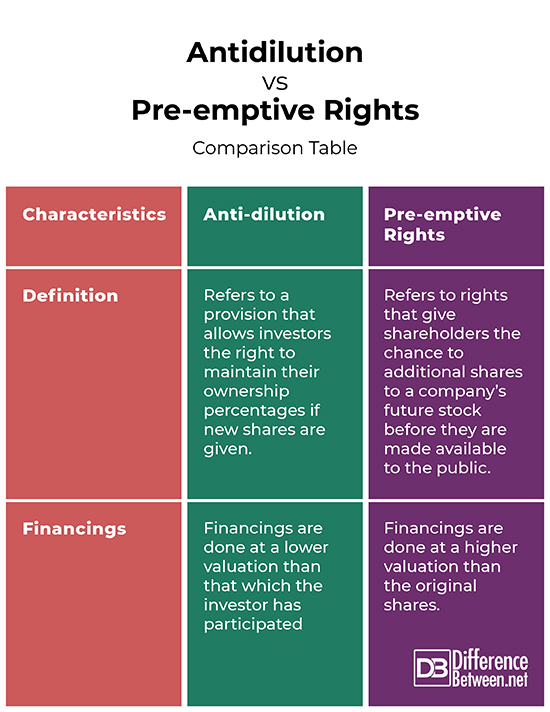Differences Between Anti-Dilution and Preemptive Rights
Any investment is a risk. And some carry more risk than others. The outcome can be lower than you initially invested. Companies have hence come up with ways to secure their shareholders from loss or dilution of their shares. In this article, we look at anti-dilution and Pre-emptive Rights as two ways that ensure the investors are protected and secure. Let’s find out what they are and explore their differences.

Anti-dilution
Anti-dilution refers to a clause that allows investors the right to maintain their ownership percentages if new shares are given. Dilution, on the other hand, refers to a scenario where a shareholder’s ownership decreases as new shares are issued. An anti-dilution provision protects an investor from drops in value due to dilution.
Anti-dilution is used by most companies when giving convertible stock.
Types of Anti-dilution Provisions
There are two types of anti-dilution provisions:
- Full Ratchet Provision
A Full Ratchet provision protects investors who own options or convertible securities. It allows the investor to convert at the lowest sale price offered. The investors are hence protected if the new offering price is lower than the conversion price on the investor’s shares.
For example, an investor owns shares in a company CDF with a conversion price of 8$. If the company offers more shares at a conversion price of 4$, the original price of 8$ would be lowered to 4$. With ratchet provision, the investor would be able to purchase twice as many shares.
- Weighted Average Provision
The Weighted Average Provision uses a formula to calculate the new conversion price.
Formula: New Conversion Price=O*(A+B)/(A+C)
Where O= Old conversion price
A=Outstanding shares before new issue
B=Consideration received after the new issue
C=New shares issued
Importance of Anti-dilution
- Protects the investor- It protects the investor from market insecurities and even when the company borrows more funds at a reduced cost it will guard the initial investors.
- Protects the company- The company offering shares at a lower price than the previous rounds of financing enables it to perform better and increase the capital for expansion.

Pre-emptive Rights
Pre-emptive Rights are rights that give shareholders the chance to additional shares to a company’s future stock before they are made available to the public. The right is a contact clause and may be given to early investors in a newly public company or majority owners who want to protect their stake at a company. It may also be given to all common shareholders of a company which is not mandatory for companies. If a company decides to recognize this right for its shareholders, it must be included in the company’s charter.
The shareholder may additionally receive a subscription warrant to buy several shares of a new issue, usually equal to their percentage ownership.
Similar to an anti-dilution provision, it gives the investor the ability to maintain a certain percentage of ownership in the company as new shares are issued. Pre-emptive rights are sometimes referred to as anti-dilution rights.
These rights are necessary to shareholders because they incentivize companies so well so that they can give stocks at higher valuations whenever the need arises.
Advantages of Pre-emptive Rights
- Provide existing shareholders with a control mechanism to protect their interests in a company by preventing dilution of their shares.
- Ensure that all the investors are reliable and have the means to undertake their obligations in a company.
- Prevent majority shareholders from taking advantage of minority shareholders eg by allotting themselves more shares and at a low valuation.
- Prevent nepotism and corruption
- To ensure that all shareholders are made aware of any changes involving a company’s shareholdings and investors.
- Ensure all shareholders are treated fairly.
Disadvantages of Pre-emptive Rights
- The shareholders are restricted from the commercial freedom to sell some or all their shares to third-party buyers.
- If the shareholders are not in a position to purchase available shares, they may be forced to waive them causing involuntary dilution of their shares.
- Deterring third-party buyers- Shareholder protections may block third-party buyers from buying the company despite lengthy discussions and negotiations.
Similarities between Anti-dilution and Pre-emptive Rights
- Both protect investors from share dilution
Differences between Anti-dilution and Pre-emptive Rights
Definition
Anti-dilution refers to a provision that allows investors the right to maintain their ownership percentages if new shares are given. It protects the investor from drops in value through dilution.
Preemptive rights are rights that give shareholders the chance to additional shares to a company’s future stock before they are made available to the public.
Financings
In anti-dilution financings are done at a lower valuation than that which the investor has participated. In Pre-emptive rights, the financings are done at a higher valuation than the original shares.
Anti-dilution vs. Pre-emptive Rights: Comparison Table

Anti-dilution vs. Pre-emptive Rights: Summary
Now you know the difference between anti-dilution and pre-emptive rights. Anti-dilution is a clause that allows investors the right to maintain their ownership percentages if new shares are given. Pre-emptive Rights are rights that give shareholders the chance to additional shares to a company’s future stock before they are made available to the public. Both protect the investors from possible dilution of their shares. Knowledge is power.
FAQS
What is an anti-dilution right?
An Anti-dilution right is a clause that allows investors the right to maintain their ownership percentages if new shares are given.
How does the anti-dilution clause work?
An anti-dilution provision protects an investor from drops in value due to dilution.
How does the preemptive right protect shareholders from dilution?
These are rights that give shareholders the chance to additional shares to a company’s future stock before they are made available to the public. The rights enable early investors to protect their stake in the company.
What are anti-dilution adjustments?
It’s a provision contained in a security or merger agreement that provides current investors the right to maintain their ownership percentage in a company by buying an equivalent number of new shares when securities are issued.
- Difference Between Profit Center and Investment Center - July 2, 2022
- Difference Between Anti-Trust and Anti-Competition - June 6, 2022
- Difference Between Stocktaking and Stock Control - June 6, 2022
Search DifferenceBetween.net :
Leave a Response
References :
[0]Daniel L & Matt S. The Corporate, Securities, and M&A Lawyer's Job: a Survival Guide. American Bar Association. General Practice, Solo & Small Firm Division. American Bar Association, 2007. https://books.google.co.ke/books?id=U4XsjkC8YdMC&pg=PA21&dq=Differences+between+Anti-dilution+and+Preemptive+Rights&hl=en&sa=X&ved=2ahUKEwj1yuGfz6b1AhUQ0uAKHYoaAYo4ChDoAXoECAoQAg#v=onepage&q=Differences%20between%20Anti-dilution%20and%20Preemptive%20Rights&f=false
[1]Let's Keep it simple. Fincurious: Startup Finance. Notion Press, 2020. https://books.google.co.ke/books?id=gf8BEAAAQBAJ&pg=PT66&dq=Differences+between+Anti-dilution+and+Preemptive+Rights&hl=en&sa=X&ved=2ahUKEwj1yuGfz6b1AhUQ0uAKHYoaAYo4ChDoAXoECAcQAg#v=onepage&q=Differences%20between%20Anti-dilution%20and%20Preemptive%20Rights&f=false
[2]Ingley C & Tourani-Rad A. Handbook on Emerging Issues in Corporate Governance. World Scientific, 2011. https://books.google.co.ke/books?id=6nzblA1vkm8C&pg=PA11&dq=Differences+between+Anti-dilution+and+Preemptive+Rights&hl=en&sa=X&ved=2ahUKEwj1yuGfz6b1AhUQ0uAKHYoaAYo4ChDoAXoECAgQAg#v=onepage&q=Differences%20between%20Anti-dilution%20and%20Preemptive%20Rights&f=false
